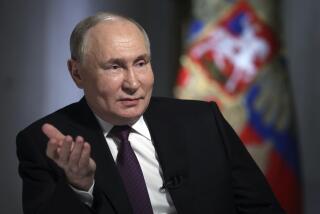Bush Must Realize the Nuclear Option Is No Option at All
- Share via
For decades, U.S. presidents have been spared the agonizing decision of whether nuclear weapons should be used in battle. But war in Iraq could force the issue to the president’s desk.
For several years, Washington’s policy has been to hint that nuclear weapons might be used against anyone who unleashed biological or chemical weapons against the U.S., its troops or its allies.
It has been called a policy of calculated ambiguity, and it is believed to have been part of the reason that Saddam Hussein did not use chemical or biological weapons during the Gulf War.
The policy of calculated ambiguity may work during a U.N.-sanctioned invasion of Iraq. There are probably plenty of senior Iraqi military officers who would also understand the consequences for them personally if they authorized or took part in any use of a weapon of mass destruction.
But a cornered tyrant and his desperate henchmen could believe that they have nothing to lose.
Deterrence could fail.
Then President Bush would face a fateful decision. Should he set an example for the future by using nuclear weapons in retaliation for an enemy’s use of biological weapons? Should he respond with nuclear weapons to bring the Iraqi war to a rapid conclusion, as happened in Japan in 1945? Would an eye for an eye be seen as the right response, by public opinion, no matter what the strategic consequences might be?
We know little of the administration’s thinking on this issue, not surprisingly, given a policy of calculated ambiguity.
We can assume that Bush would share his predecessors’ reluctance to open a door that has been closed since two American atomic bombs leveled Hiroshima and Nagasaki. But if Hussein unleashes biological weapons, the landscape of warfare will have dramatically changed.
According to the memoirs of former Secretary of State James A. Baker III, there were two levels of deterrence working against Hussein during the Gulf War: first, a threat to remove the Iraqi leader from power, and second, a vague threat to use nuclear weapons.
Today, Hussein’s removal would be a war aim rather than a threat.
The impression that the United States would retaliate with nuclear weapons could continue to deter--up until the time Hussein no longer cared what happened to him or his nation.
Clearly, the U.S. would want to eliminate Hussein’s biological and chemical weapons and his nascent nuclear weapons program at the very outset of a war. Airstrikes could substantially degrade any biological and chemical capabilities that Iraq may possess.
Whether preemptive strikes could completely destroy them is problematic, if Iraqi mobility and concealment of chemical and biological facilities are as effective as some defense experts claim.
Given that doubt, one would think that the president would want to engage in a maximum effort right now to find and destroy Iraqi weapons of mass destruction. This would require the use of U.N. inspectors backed up by national intelligence with unfettered right of timely access.
Yet if the goal of “regime change” is given equal priority, as the administration seems to wish, Hussein would doubtless interpret United Nations disarmament efforts as a first step designed to weaken him. If discussion of a regime change were deferred, the chances of eliminating Iraq’s weapons of mass destruction by peaceful means might improve somewhat.
Strongly supported by British Prime Minister Tony Blair, the administration portrays Hussein as the master of a serious biological and chemical weapons capability. If that is so, then enormous harm could come to U.S. and allied troops and to thousands of innocent civilians, even with a seriously degraded Iraqi biological weapons capability, if deterrence or preemptive attacks fail in any respect.
The first President Bush was inclined against eye-for-an-eye retaliation for reasons that still apply today. U.S. dominance in other advanced weaponry makes recourse to nuclear weapons unnecessary to defeat Hussein, according to all reports.
And, because it would encourage the spread of nuclear weapons and lower the barriers to nuclear conflict, nuclear retaliation by the U.S. would be a self-defeating policy. It would open the door for nuclear war in regional conflicts elsewhere and could spark a global nuclear arms race.
That would be the deadliest of the many terrible legacies Hussein could leave to the world.
Even if he will not tell us, Bush should decide against the use of nuclear weapons.
More to Read
Get the L.A. Times Politics newsletter
Deeply reported insights into legislation, politics and policy from Sacramento, Washington and beyond. In your inbox twice per week.
You may occasionally receive promotional content from the Los Angeles Times.










